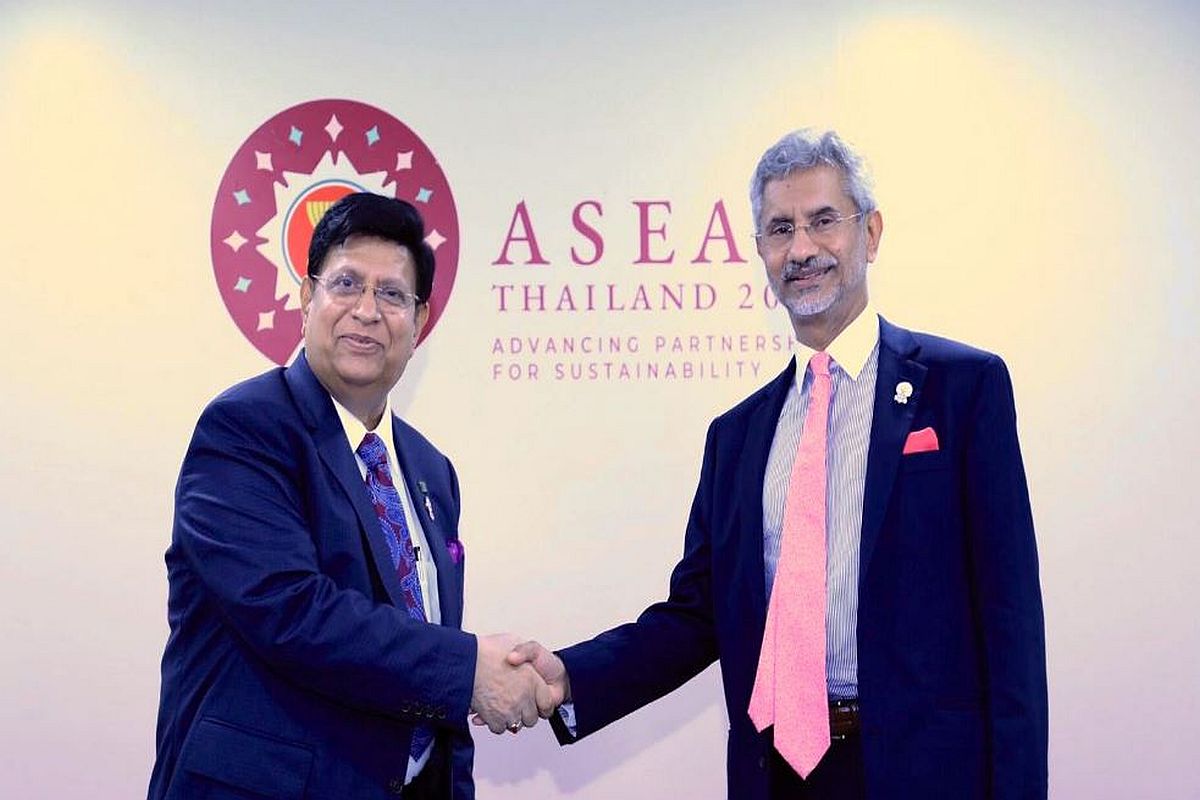Bangladesh portraying India negatively, New Delhi tells Dhaka
The Bangladesh envoy was told that the comments attributed to Bangladesh former Prime Minister Sheikh Hasina have been made in her individual capacity in which India has no role to play.
In the 2019 manifesto the party said, “We will continue to undertake effective steps to prevent illegal immigration in the north-eastern states.”

External Affairs Minister S Jaishankar with Bangladesh Foreign Minister Dr AK Abdul Momen. (Photo: Twitter | @DrSJaishankar)
What will be the impact of the Citizenship Amendment Act on Indo-Bangladesh ties which have been described as the “Shonali Odhyay” (golden period)? Even though the two countries are playing down differences, Dhaka’s displeasure is barely concealed. This law has been passed just days ahead of December 16, Bangladesh’s Liberation Day. Dhaka is worried because the CAA seeks to provide citizenship to non- Muslim persecuted religious minorities from Bangladesh, Pakistan and Afghanistan.
The new law would give them the right to vote and can impact the upcoming assembly elections in the state. Most Bangladeshi refugees to benefit from the scheme are already residing in India but without benefits. The BJP expects a minimum of 1.5 crore Hindus to become citizens. There is a domestic and international aspect to the issue. Though Bangladesh Prime Minister Sheikh Hasina had observed during her brief visit to Kolkata on November 22, “We have excellent relationship.
Advertisement
I think our mutual ties are at their best now. We want to continue out good relations with our neighboring nations”, the last-minute cancellation of the visit of two ministers – Bangladesh Foreign minister and Home minister – this week indicates that all is not well. Several reasons have been cited for the cancellation, which came a day after the passage of CAB. New Delhi though claims that it has no connection with the cancellation. Dhaka was also upset following roll-out of the National Register of Citizens (NRC) in Assam some time ago even though New Delhi conveyed to Bangladesh that it was an internal matter.
Advertisement
Hasina had even taken up the issue of NRC with PM Narendra Modi during their bilateral meeting in New York in September. Bangladesh watchers believe that the BJP’s current exercise of building a political narrative on Bangladeshi migrants is not conducive for Indo- Bangladesh ties. Bangladesh has concerns about the mischief potential of the CAA-NRC package. While they fear that it might lead to harassment of minorities in order to grab their property, there is also some apprehension that it might result in mass migration of Muslims towards Bangladesh.
Though New Delhi did some damage control by stating that “the current government in Bangladesh is also taking care of religious minorities,” it was not sufficient to assure Dhaka. Indo-Bangladesh ties have been on a high since 2009. After Sheikh Hasina assumed power, there have been high-level visits from both sides. She has been working closely with New Delhi addressing India’s concern on security-related issues. The growing connectivity – rail, road and air – is also noteworthy.
New Delhi too had reciprocated by giving liberal aid and increased trade and economic relations with Dhaka. India has ensured duty-free access of Bangladeshi goods to the Indian market. Though India has taken up the issue of illegal immigration at the political and diplomatic level, it is of no avail. Dhaka has neither acknowledged the presence of illegal Bangladeshi migrants in India nor taken any effective measures to control their flow. The Indian government’s efforts over the years to stem the tide by erecting a barbed-wire fence along the border and enhancing border surveillance have failed to check the inflow.
On the domestic side, it has been a political and electoral issue for the BJP since long. The BJP had played up the NRC exercise in Assam as an antiillegal Bangladeshi drive. After India and Nepal, Bangladesh has the third largest Hindu community in the world. However, Bangladesh’s Hindu population has fallen from around 22 or 23 per cent in 1951 to around 8 per cent in 2011 according to their census. The BJP has been steadfast in its idea of a Hindu Rashtra. The party had officially adopted a resolution in its national executive in Bhopal ahead of the 1996 elections demanding detection of illegal immigrants, deletion of their names from voters’ lists, and their deportation to Bangladesh.
Since then it has remained an issue in every BJP election manifesto. In the 2019 manifesto the party said, “We will continue to undertake effective steps to prevent illegal immigration in the north-eastern states.” Using the CAANRC package the BJP hopes to plan its 2024 election strategy on a poll plank of redefined popular nationalist sentiments. Detecting illegal immigrants in India is a daunting task indeed. The 4,096-kilometer long border is porous. The fact that most of the illegal migrants already hold ration cards, voter identity cards, or Aadhaar cards makes it difficult. To prevent the inflow, border fencing has been attempted but vigorous patrolling and other measures including better communication, electronic surveillance would be needed.
Therefore, despite the claim that it’s the golden era of the Indo- Bangladesh relationship, these concerns need to be addressed by both sides. The relationship should be built between states and involve people-topeople communication. The way forward for a more stable and long-term friendly relationship would lie in understanding these challenges.
Advertisement